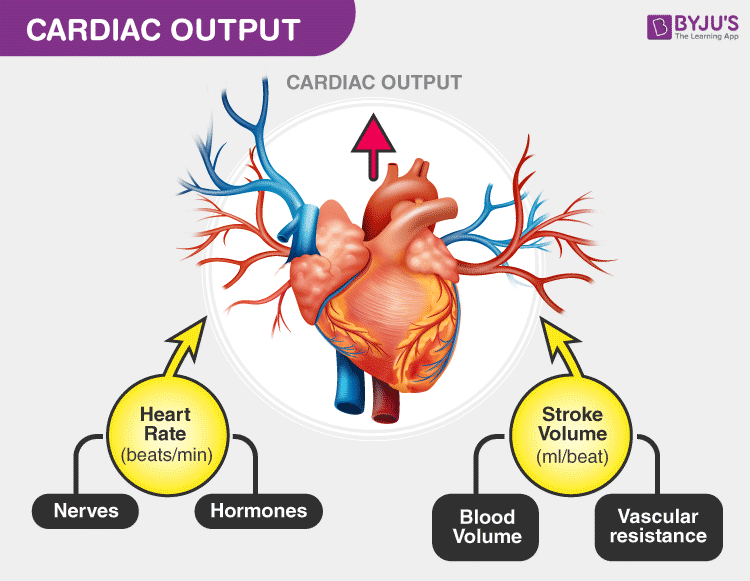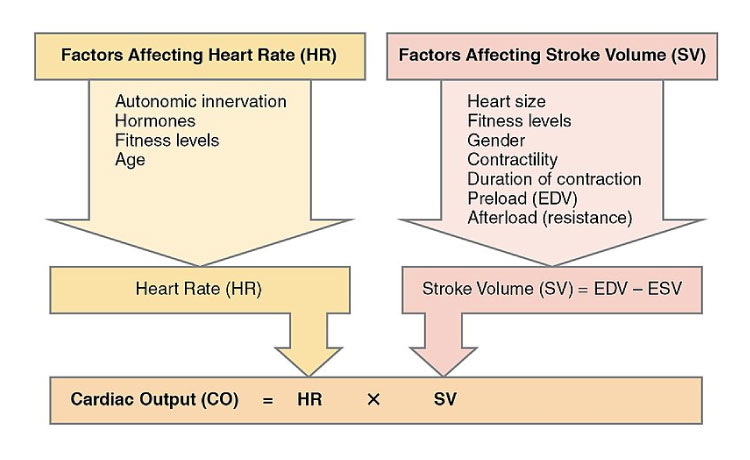What is Cardiac Output?
“Cardiac output refers to the volume of blood pumped out per ventricle per minute.”
Cardiac output is the function of heart rate and stroke volume. The amount of blood pumped by the left ventricle in one compression is called the stroke volume.
Cardiac Output is an excellent example to exhibit the efficiency of the human heart. It is related to the amount of blood pumped by the heart per minute. A normal cardiac output would be about five litres of blood per minute in a healthy individual.

The cardiac output comprises 2 vital components:
- Heart rate: It refers to the number of times the heart beats per minute (bpm).
- Stroke volume: It refers to the quantity of blood pumped out of each ventricle with every heartbeat.
Factors Determining Cardiac Output
The following factors determine the cardiac output of a human heart:
Venous Return
This is the amount of blood that enters the heart through the veins per minute. After a certain time interval, the venous return becomes equal to the cardiac output.
Force of Contraction
The stroke volume and the cardiac output increases with the increase in the force of contraction.
Heart Rate
The cardiac output increases with the increase in heart rate.
Cardiac Output Formula
The equation for cardiac output is:
Cardiac Output (CO) = HR x SV

Cardiac Output Calculation
For example: If the heart rate is 70 bpm and stroke volume is 70 ml.
Using the formula: HR X SV
= 70 X 70
= 4900 ml/min or 4.9 liters per minute.
Cardiac Output Measurement
There are different merits and demerits of measuring cardiac output using methods in an invasive and non-invasive manner. At present, there is no standard comparison system available for these methods using a reference measurement or standards.
The invasive systems are well accepted, but there is progressing evidence that these systems are neither accurate nor effective in guiding therapy.
Some of the methods to measure cardiac output are listed below:
- Doppler ultrasound
- Echocardiography
- Transcutaneous
- Transoesophageal
Low output results in heart failure, a severe infection or heart diseases.
The high output may be an indicator of blood infections.
Also Read: Cardiac Cycle
Cardiac Index
“Cardiac index is defined as the cardiac output divided by the body surface area.”
It is a hemodynamic parameter that relates the cardiac output from the left ventricle in one minute to the body surface area.
Cardiac Index = Cardiac Output/Body Surface Area
Stroke volume index is the stroke volume divided by the body surface area.
To learn more about cardiac output, its definition and the factors affecting cardiac output, keep visiting BYJU’S website or download BYJU’S app for further reference.
Frequently Asked Questions
What is Cardiac output?
The cardiac output is cardiac physiology term which describes the functioning of a human heart, and also about the total volume of blood (5 to 6 litres) being pumped every minute. Normal cardiac output is said when a person is resting.
When does the body need a higher cardiac output?
During exercise, running, tensed and other workouts, our body requires three or four times more than the normal cardiac output.
What happens during a higher cardiac output?
During the higher cardiac output, our heart functions faster and stronger to increase the pumping of blood into our body. This is because our body cell, tissues and muscles need more oxygen when we exert ourselves.
How is cardiac output calculated?
As we all know, Cardiac output is the total volume of blood that heart pumps every minute.
The formula used to calculate cardiac output is given as CO = HR × SV.
Where:
CO – Cardiac output
HR – Heartbeat rate per minute
SV- Stroke volume — the amount of blood circulated by the heart with each beat.
Is it important to maintain cardiac output?
Yes. Because, an adequate cardiac output helps to keep our blood pressure at the normal levels, which is required to supply oxygen-rich blood to our brain and other vital parts of our body.

BYJU’S is indeed such a great education site
what are the factor affecting cardiac output, describe the factors regulating cardiac output?
Factors that regulate cardiac output are ion concentration, blood pressure, body temperature, stress, emotions, sex, and age. It is regulated by the autonomic nervous system and hormones.